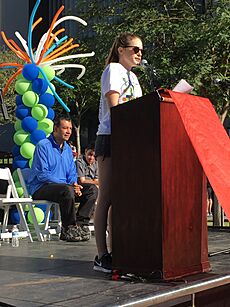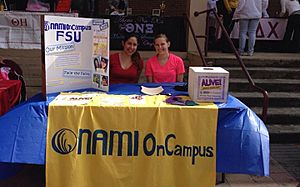National Alliance on Mental Illness facts for kids
 |
|
| Founded | 1979 |
|---|---|
| Founders | Harriet Shetler Beverly Young |
| Type | Nonprofit 501(c)(3) |
| Focus | Mental Health, Crisis Intervention |
| Headquarters | 4301 Wilson Blvd., Arlington County, Virginia, U.S. |
|
Area served
|
United States |
| Method | Support, education, awareness, advocacy, and research |
The National Alliance on Mental Illness (NAMI) is a group in the United States that helps people and families affected by mental illness. It started as a small group of families. NAMI's main goal is to offer support, education, and public awareness. They want everyone affected by mental illness to live healthy and fulfilling lives.
NAMI provides classes and training for people with mental illnesses, their families, and community members. These programs teach about mental health. NAMI also holds events like Mental Illness Awareness Week and NAMIWalks. These events help raise money and spread awareness.
NAMI's main office is in Arlington, Virginia. It has about 1,000 local groups across all 50 U.S. states, Washington, D.C., and Puerto Rico. NAMI gets money from donations, company support, events, and grants. They also publish a magazine called The Advocate and run a HelpLine for support.
Contents
How NAMI Started
NAMI was founded in Madison, Wisconsin, in 1979. Two women, Harriet Shetler and Beverly Young, started it. Both women had sons with schizophrenia, a type of mental illness. They felt frustrated because there wasn't enough help available. They also felt blamed for their sons' conditions.
So, they looked for other families who felt the same way. Their first meeting led to the creation of NAMI. In 1997, the group changed its name to just "NAMI." This was to use more respectful language. Later, in 2005, the full name became "National Alliance on Mental Illness."
What NAMI Does
NAMI's main goal is to help people recover and strengthen family relationships. They offer many programs and services. These include educational classes, support groups, and helpful information.
At first, NAMI mainly focused on family members. But now, they also work to include people who have mental illnesses themselves. NAMI also works hard to fight stigma. Stigma means unfair or negative ideas about mental illness. Another goal is to help everyone better understand mental health. They also work to make the mental health system better.
How NAMI Is Organized
NAMI is a nonprofit organization. It is run by a board of directors. The national NAMI office is like the main headquarters. Then there are state and local groups. These local groups work somewhat on their own. This helps them better serve the people in their communities.
The current leader of NAMI is Daniel H. Gillison, Jr. He helps guide the organization's plans.
NAMI's national and state groups help with leadership, public education, and speaking up for people. Local NAMI groups also help people find mental health resources. They organize NAMI programs and host local meetings and events.
Working with Others
Famous Supporters
NAMI has worked with many famous people and influencers. They help spread awareness about mental health. Some of these supporters include:
- AJ Lee
- Alessandra Torresani
- Andrea Barber
- Brittany McGowan
- Carly Chaikin
- Chris Hubbard
- Chris Wood
- Clark Gregg
- Corinne Foxx
- David Kendrick
- DeWanda Wise
- Frank Shamrock
- Jamie Gray Hyder
- Jeannie Mai
- Maria Bamford
- Marin Hinkle
- Master P
- Maurice Benard
- Mauro Ranallo
- Mayim Bialik
- Morgan Stewart
- Nadya Okamoto
- Naomi Judd
- Rachel Bloom
- Stefania Owen
- Sterling K. Brown
- Sutton Stracke
- Taraji P. Henson
- Tritonal
- Utkarsh Ambudkar
- Vincent Valentine
- Wil Wheaton
- Willa Amai
Leaders Working Together
Since 2020, NAMI's CEO Daniel Gillison, Jr. has brought together leaders from other mental health groups. They work together to improve mental health care in the country. This group includes leaders from organizations like the American Foundation for Suicide Prevention and Mental Health America.
Community Friends
NAMI also works with other groups in the community. For example, they partner with VoteRiders to share information about voter ID rules.
Other partners include:
- Alpha Kappa Alpha
- Counter Logic Gaming
- Fox Sports
- HOSA-Future Health Professionals
- Jack and Jill of America
- The Jed Foundation
- Lokai
- Stanley Center for Psychiatric Research at Broad Institute
- Tumblr
- Women's Health
NAMI's Approach
NAMI generally sees mental illnesses as health conditions, much like physical illnesses. They believe in understanding these conditions and helping people get the right support. NAMI also talks about anosognosia. This is when someone might not realize they have a mental health condition.
Advocacy Efforts
NAMI works to make life better for people with mental health conditions. They push for better healthcare and crisis support. They also work to stop discrimination and harmful practices related to mental illness.
NAMI Programs
NAMI offers many programs to support and educate individuals and families. Most of these programs are free. Local NAMI groups set up these programs. Each program is designed for a different group of people.
NAMI Family-to-Family
This is a free eight-week course for family members and friends of people with mental illness. It teaches about mental illness from a health perspective. The classes are taught by a NAMI-trained family member. They have personal experience with mental illness. This program is available in many states and parts of Canada.
What You Learn
The Family-to-Family program gives general information about mental illness. It covers conditions like schizophrenia, depression, and bipolar disorder. It also explains medications and their effects. The program helps families learn coping skills and how to find resources. It also teaches how to handle a crisis.
NAMI Peer-to-Peer
This is an eight-week education program for adults who have a mental illness. It helps them on their journey to recovery. The program includes talks, discussions, and exercises. It also teaches ways to manage stress. It shares information about mental illness and how to work with healthcare providers. This program is also available in Spanish.
NAMI In Our Own Voice
The NAMI In Our Own Voice (IOOV) program started in 1996. It lets people who are living well with mental illness share their stories. The idea is that their experiences can help others. This program shows that recovery is possible. It also helps build confidence and self-esteem.
Two trained speakers share their personal stories about mental illness with an audience. This program helps raise awareness about NAMI and mental illness. It also works to reduce stigma. IOOV often educates groups like law enforcement, politicians, and students.
NAMI Basics
The NAMI Basics Program is a six-session course. It is for parents or other main caregivers of children and teenagers with mental illness. It's like Family-to-Family but focuses on the special challenges of caring for a child. It also explains how mental illness can show up differently in kids.
NAMI Connection
The NAMI Connection Recovery Support Group Program is a weekly support group. It is for adults (18 and older) who have a mental illness. These groups meet for 90 minutes and are led by trained people. These leaders also have personal experience with mental illness.
NAMI On Campus
NAMI On Campus helps university students start NAMI groups at their schools. This program helps college-aged students with mental health issues. Many mental illnesses first appear when people are young adults. Surveys show that stigma is a big reason why students don't get help.
Ending the Silence
This program is 50 minutes to one hour long. It's for students, school staff, and family members. Two people present: one shares information, and a young adult shares their personal story of living well in recovery. This program helps middle and high school students learn more about mental health.
In 2017, former Second Lady of the United States Tipper Gore donated $1 million to this program.
How NAMI Is Funded

NAMI gets money from many places. This includes companies, government agencies, foundations, and individuals. NAMI makes sure to avoid conflicts of interest. They do not support any specific treatment or service. You can find records of NAMI's donations on their website.
Company Supporters
NAMI works with many companies that support their mission. Some of these include:
- Acadia Pharmaceuticals
- Alkermes
- Bank of America
- Beacon Health Options
- Boehringer Ingelheim
- Boeing
- Bristol Myers Squibb
- Chiesi Global Rare Diseases
- Corcept Therapeutics
- Genentech
- Janssen
- Kaiser Permanente
- KPMG Foundation
- Lululemon
- Lundbeck
- Myriad Genetics
- Neurocrine Biosciences
- NeuroStar
- Northrop Grumman
- Novo Nordisk
- Otsuka Pharmaceutical
- Pfizer
- Sunovion
- Takeda Pharmaceutical Company
- Teva Pharmaceuticals
NAMIWalks
NAMIWalks are events where people walk to raise money for NAMI. In 2017, these walks raised $11.3 million across the country. About 68,000 people took part.
COVID-19 Mental Health Support Fund
NAMI started a special fund to help with mental health during the COVID-19 pandemic. This fund received donations from companies and other groups. NAMI also launched the Frontline Wellness program. This program helps healthcare workers.
See also
- Cole Resource Center
- Self-help groups for mental health
- Treatment Advocacy Center
 | Isaac Myers |
 | D. Hamilton Jackson |
 | A. Philip Randolph |


